#Jordan Nixon
Explore tagged Tumblr posts
Text
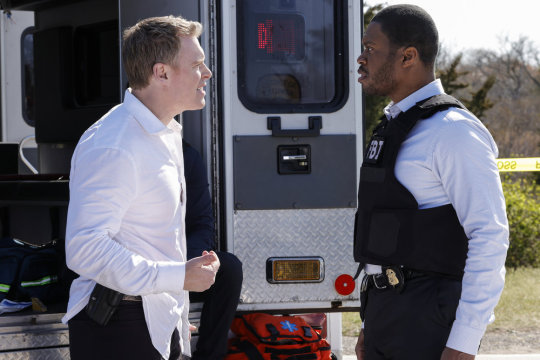

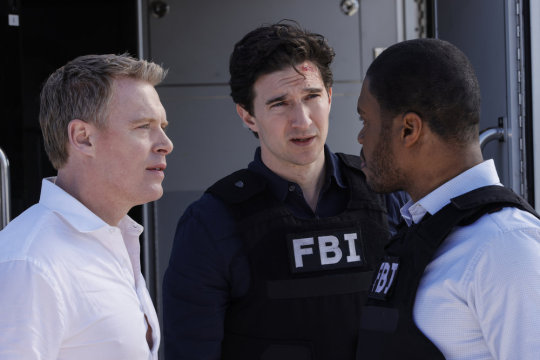





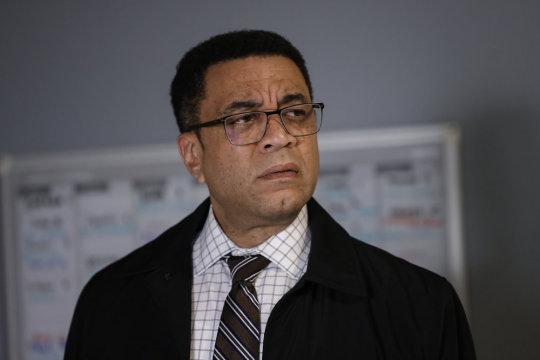
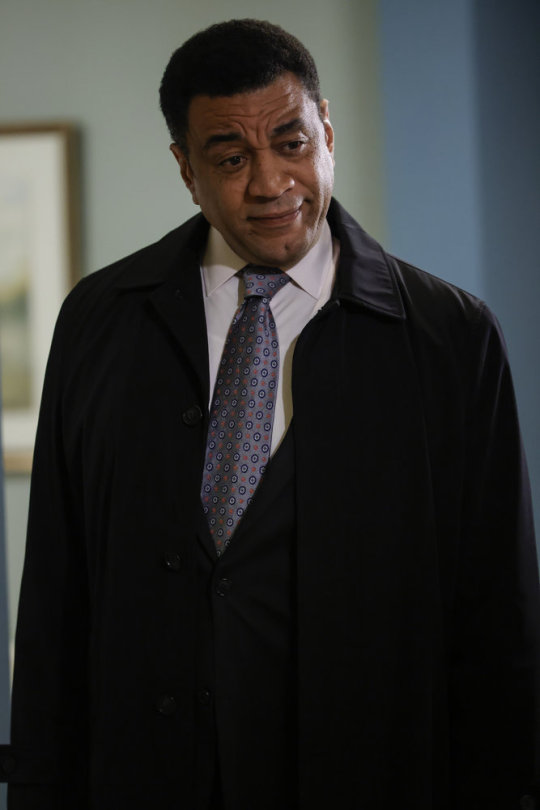



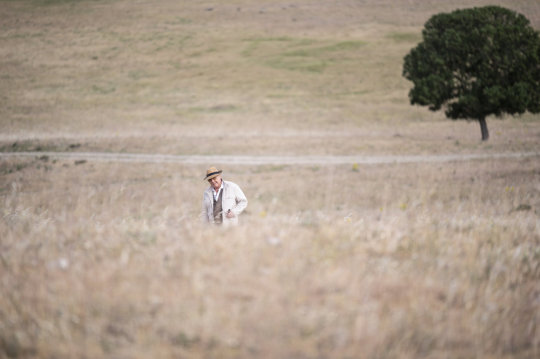
NBC Promo Pics for Episode 10.22
"THE BLACKLIST"
"RAYMOND REDDINGTON #00: GOOD NIGHT
ORIGINAL
07/13/2023 (09:00PM - 10:01PM) (Thursday) : Series finale, part 2. The future of the FBI’s Reddington Task Force is decided
75 notes
·
View notes
Text
#Hazbin hotel#helluva boss#millie helluva boss#Joe helluva boss#blitzo and loona#blitzo helluva boss#blitzo#blitzø#Loona#loona helluva boss#octavia goetia#Stolas goetia#vivziepop#charlie morningstar#lucifer morningstar hazbin hotel#charlie and lucifer#stolas and octavia#jeremy jordan#erika henningsen#erica lindbeck#brandon rogers#bryce pinkham#barrett wilbert weed#vivian nixon
32 notes
·
View notes
Text

Representative Barbara Jordan's Corrections to the Transcript of Her Statement on the Articles of Impeachment of President Richard Nixon
Record Group 233: Records of the U.S. House of RepresentativesSeries: Committee Papers of the Committee on the Judiciary
[crossed out] at the appropriate time. [/crossed out]
I recognize the gentlelady from Texas, Ms. Jordan, for the purpose of general debate, not to exceed a period of 15 minutes.
Ms. Jordan. Thank you, Mr. Chairman.
Mr. Chairman, I join my colleague, Mr. Rangel, in thanking you for giving the junior members of this Committee the glorious opportunity of sharing the pain of this inquiry. Mr. Chairman, you are a strong man and it has not been easy, but we have tried as best we can to give you as much assistance as possible.
Earlier today we heard the beginning of the Preamble to the Constitution of the United States, "We, the people." It is a very eloquent beginning. But when that document was completed on the 17th of September in 1787 I was not included in that "We, the people." I felt somehow for many years that George Washington and Alexander Hamilton just left me out by mistake. But through the process of amendment, interpretation and court decision I have finally been included in "We, the people."
Today I am an inquisitor, [crossed out] and [/crossed out] I believe [crossed out] it [/crossed out] hyperbole would not be fictional and would not overstate the solemness that I feel right now. My faith in the Constitution is whole, it is complete, it is total, [crossed out] and [/crossed out] I am not going to sit here and be an idle spectator to the diminution, the subversion, the destruction of the Constitution.
39 notes
·
View notes
Text

Barbara Jordan was a civil rights leader and progressive politician from Texas. She was first African-American woman from the south elected to the United States House of Representatives.
Jordan achieved notoriety for delivering a powerful opening statement at the House Judiciary Committee hearings during the impeachment process against Richard Nixon. In 1976, she became the first African-American, and the first woman, to deliver a keynote address at a Democratic National Convention.

Jordan is also known for her work as chair of the U.S. Commission on Immigration Reform.
In her 1979 autobiography Jordan recalled "having a swell time" meeting Nancy Earl for the first time in the late 1960s.
"I had had a great time and enjoyed myself very much. I remember I thought: This is something I would like to repeat… Nancy Earl is a fun person to be with … I could relax and enjoy myself … I had discovered I could relax at parties like that where I was safe."
Jordan and Earl were together for nearly 30 years. They bought land in Texas together and built a home in 1976. Earl, an educational psychologist, occasionally helped with speechwriting.
Jordan never publicly identifying as lesbian or queer. She was open about her relationship with Earl in private. But because she was the subject of homophobic attacks, and her advisors cautioning her against revealing the extend of her relationship with Earl in public.
Jordan retired in 1979 after three terms in Congress due to health challenges from multiple sclerosis. Nancy Earl became her caretaker as her health declined.
After leaving office, Jordan received the Nelson Mandela Award for Health and Human Rights in 1993, and a Presidential Medal of Freedom, presented by President Bill Clinton in 1994.
An obituary in The Houston Chronicle described Earl as Jordan's "longtime companion" — the first public confirmation of their relationship.

#gay icons#Barbara Jordan#african american#lesbian or queer#Nancy earl#longtime companion#richard nixon#nelson mandela#civil rights#homophobic attacks
12 notes
·
View notes
Text

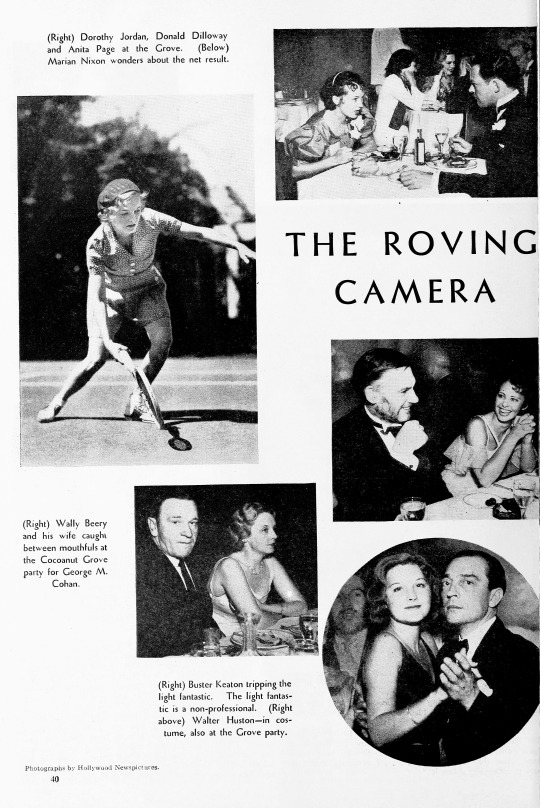
(Right) Buster Keaton tripping the light fantastic. The light fantastic is non-professional The Roving Camera - Modern Screen
#buster keaton#1930s#1910s#1920s#1920s hollywood#silent film#silent comedy#silent cinema#silent era#silent movies#pre code#pre code hollywood#pre code film#pre code era#pre code movies#damfino#damfinos#vintage hollywood#black and white#buster edit#old hollywood#slapstick#dorothy jordan#donald Dilloway#anita page#marian nixon#wallace beery#modern screen#Walter Huston
12 notes
·
View notes
Text
All About My Mother - Theatre Review: The Seven Year Disappear (Pershing Square Signature Center, New York) ★★★1/2
Cynthia Nixon is magnificent in The New Group’s Off-Broadway world premiere production of Jordan Seavey’s intriguingly meta play The Seven Year Disappear running at The Pershing Square Signature Center through March 31st. Outside the Signature’s Alice Griffin Jewel Box Theatre, there is an overview of the career of fictional mononymous performance artist Miriam (Nixon). The description does not…
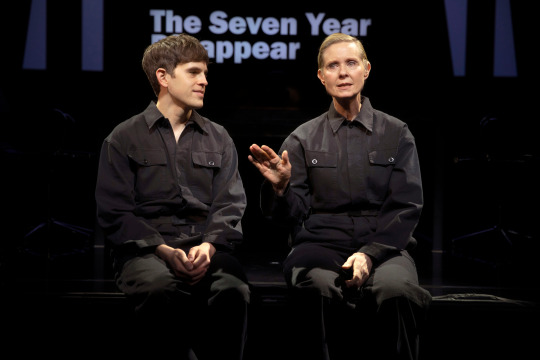
View On WordPress
#cynthia nixon the seven year disappear review#gay#gay character#Gay theater#James Kleinmann#lgbt#lgbtq#LGBTQ chracters#lgbtq off-broadway#lgbtq theatre#new york theater 2024#New York theatre#off-broadway 2024#off-broadway theatre review the seven year disappear#queer#Queer characters#queer theater#queer theatre#review the seven year disappear by Jordan Seavey#The Queer Review#the seven year disappear#the seven year disappear pershing square signature center#the seven year disappear review#the seven year disappear taylor trensch#the seven year disappear theater review#the seven year disappear theatre review
0 notes
Text
'The Seven Year Disappear,' Mother-Son Relationship Chaos as Performance Art
Taylor Trensch and Cynthia Nixon in 'The Seven Year Disappear' are a dynamic duo.
Cynthia Nixon, Taylor Trensch in The Seven Year Disappear (Monique Carboni) In The Seven Year Disappear, Jordan Seavey (Homos, or Everyone in America), creates celebrated, bi-polar, performance artist Miriam (Cynthia Nixon), and her gay son Naphtali (Hebrew for “my struggle, my strife”), played by Taylor Trensch, to elucidate the darkness in a mother-son relationship when the personalities are…

View On WordPress
#Cynthia Nixon#Jordan Seavey#Scott Elliott#Taylor Trench#The New Group#The Seven Year Disappear#The Signature Center
0 notes
Text
The New Group's "The Seven Year Disappear" Is a Sweet Wonderful Lollipop of Strong Whiskey and Sadness
#frontmezzjunkies reviews: #TheNewGroup's #TheSevenYearDisappear written by #JordanSeavey directed by #ScottElliott with #CynthiaNixon & #TaylorTrensch #OffBroadway @TheNewGroupNYC #tng7YearDisappear
Taylor Trensch and Cynthia Nixon in The New Group’s The Seven Year Disappear. Photo by Monique Carboni. The Off-Broadway Theatre Review: The New Group’s The Seven Year Disappear By Ross “Have I got the complicated guy for you?” And with that commentary from one friend to another, The New Group‘s fantastically layered cocktail of whisky and sadness dives in. It’s a deliciously adept remark,…
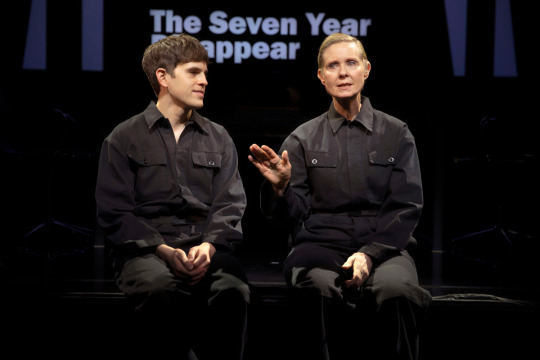
View On WordPress
0 notes
Text
Seriously, run don't walk to go see Jeremy in this role before his run ends! I'm so grateful that I got to witness this magic in person! ✨










in case you were wondering....i am not okay
#😭😭😭#jeremy jordan#the great gatsby#the great gatsby musical#jay gatsby#musical#theatre#musical theatre#broadway#dariana mullen#sara chase#alex prakken#samantha pollino#carissa gaughran#jasmine villaroel#kurt csolak#austin colby#ryah nixon#dan rosales
44 notes
·
View notes
Text
The Great Gatsby (Broadway) July 14, 2024
Jeremy Jordan (Jay Gatsby), Eva Noblezada (Daisy Buchanan), Noah J. Ricketts (Nick Carraway), Samantha Pauly (Jordan Baker), Ryah Nixon (u/s Myrtle Wilson), John Zdrojeski (Tom Buchanan), Paul Whitty (George Wilson), Eric Anderson (Meyer Wolfsheim)
Release Info & Screenshots
#broadway bootleg#musical bootleg#slime tutorial#the great gatsby#jeremy jordan#eva noblezada#hadestown#newsies#supergirl
220 notes
·
View notes
Note
do u have posts where you talk abt prison abolition and alternatives to police? that'd be nice
so i've actually tried to approach abolition before multiple times and quite frankly, there are so many incredibly valuable insights provided by POC (People Of Color) and lifelong abolitionists that exist on the internet, it would be a tremendous disservice for my pasty white ass to sit here and try and educate anyone on this topic alone.
the last time i had this ask come up (you can find that post here), i deferred to FD Signifier for my thoughts on police abolition. i will do so again here for maximum visibility because he deserves it far more than i do. it is close to 2 hours long, but easily the best explanation or breakdown you'll find in such a relatively short time frame.
youtube
i'll expand on this by offering some of the more popular works that i'm aware of and a few works that i've read regarding abolition.
"invisible no more" by andrea j. ritchie provides an examination of how Black women, indigenous women, and women of color experience racial profiling, police brutality, and immigration enforcement. it aims to contextualize individual stories within the broader system of police violence and mass incarceration, calling for a radical shift in the way that we look at public safety.
"policing the planet" edited by jordan t. camp and christina heatherton combines firsthand accounts from activists with research from scholars and artistic reflections. it aims to trace back the global spread of the broken-windows policing strategy and its wide-ranging effects.
"our enemies in blue: police and power in america" by kristian williams addresses the history of policing in the united states, arguing that police brutality is intrinsic to law enforcement. it explores the relationship you've probably heard before between police and power from the era of slave patrols to modern times.
"the new jim crow" by michelle alexander extremely influential, you've probably heard of this one. it goes over how the u.s. criminal justice system functions as a system of racial control, particularly through the failed war on drugs, disproportionately targeting Black men and devastating communities of color (obligatory fuck nixon and reagan)
"violence work: state power and the limits of police" by micol siegel offers a new perspective on the police as the embodiment of state power, interconnected with the state and global capital. this one gives a unique examination of the u.s. state department's office of public safety and its influence on international police training.
"chokehold: policing Black men" by paul butler, who is a former federal prosecutor, examines the laws and practices that systematically target Black men, perpetuating institutional violence and societal fear.
"no more police: a case for abolition" by mariame kaba and andrea ritchie presents a comprehensive and practical plan for police abolition. it addresses current concerns while envisioning a future of reduced violence and enhanced justice. this is a cornerstone work and it's been lauded in many circles as being a definitive text on police abolition.
265 notes
·
View notes
Text
i know that people are somewhat nervous about how in ep 10, guillermo is still at cannon capital. i myself, am not all that concerned, because there's some groundwork in these episodes that i am paying a lot of attention to as we continue through the season. a few things:
one being that jordan uses the family language that we have seen used by guillermo in previous seasons, but never outwardly returned by the vampires. this to me signals that cannon capital are using his needs to take advantage of him (jordan also mentions how he shows up early and stays late, and it's obvious that this job is changing guillermo as a person in a bad way). guillermo, more than anything, has wanted a place to belong, but i think his arc is realizing that the vampires are his actual family, not this soul sucking workplace. there's a lot of capitalism red flags floating around in this season that are making me nervous, because the company obviously views guillermo as expendable (where the vampires begin to work with him because they view him as not expendable -- they all fight over his room, showing they miss him, and they all show up because they're afraid of guillermo losing his mind being in the normal human world).
on top of this, it is obvious that jordan is just fulfilling the place of nandor, which guillermo has been trying to find since no longer being a part of the vampire residence full-time (calling him "master" accidentally, arguing with nandor he's not at jordan's beck and call and then answering his literal phone call). which is ironic, because this also mirrors nandor's arc in the season, with the desperation of filling the hole of guillermo in his life (which we have witnessed many times before). they are still all about each other, even when desperately focusing on other things. this applies to the relationship that nandor is trying to have with the guide, especially since it's been established that she is no longer attracted to him (s3 wedding), thought he was the conquerer but realized he wasn't (s6, ep1), and overall has not been very receptive to this change in nandor (s6, ep3) when she tells him "bye" in an irritated tone. i don't think this will work out, just like all other relationships for nandor that are not guillermo.
lastly, they are on equal footing this season more than ever before. there is no longer any "professional" involvement between them, they are just two people who were a part of each other's life for a long time, and all the complications of that. also, i think it is fair to note that kayvan has stated that they're acting a lot like exes -- how nandor can't accept that guillermo's new way of life does not include him, and in nandor's mind, it has to. he can't let guillermo go, and he doesn't want to either, and i think deep down -- guillermo is in the same boat. he helps fix vampire problems still despite saying that he wouldn't, offers a place for nandor to sit and talk when he's clearly upset (also that richard nixon speech says some things about how he feels about guillermo leaving him, even in a very fucked up roundabout way), and tries to keep nandor from being fired because he knows it will hurt nandor's feelings. is this aligned with someone who is truly over the vampires? i think not!
anyway, i have a feeling this will come to a head at some point, and it seems the promotion is going to be when that happens. also, to be noted -- that's not the last episode of the season, so chances are, we will see where the fallout goes. but how will that shake out? i don't know, but i do hope that all this setup is going somewhere because there's a ton of it this season whereas we used to not get any except a few moments here and there. this season's soul is literally the dynamic between nandor and guillermo, so i assume that this will pay off (we hope).
42 notes
·
View notes
Text

OCTOBER 25, 2024 RELEASE
All my videos can be found here, full release under the read more! I am also offering the two Great Gatsby videos as a bundle for 30 USD! If interested, please contact me at [email protected]!
This release includes: Maybe Happy Ending, Moulin Rouge! (John/Solea), The Roommate, Empire Records, Great Gatsby (Alex Prakken)
EMPIRE RECORDS September 25, 2024 | McCarter Theatre | 4K MP4 (8.32GB) | bikinibottomday’s master Cast: Lorna Courtney (Corey), Samantha Williams (Gina), Liam Pearce (AJ), Analise Scarpaci (Debra), Tyler McCall (Lucas), Eric Wiegand (Mark), Michael Luwoye (Joe), Damon Daunno (Rex Manning), Taylor Iman Jones (Max), Alex Lugo (Ensemble), Hoke Faser (Ensemble), Sam Poon (Ensemble), Leah Read (Ensemble), Maximilian Sangerman (Ensemble) Notes: Great 4K capture of this world premiere musical! One head obstruction that blocks the center-right, mostly when characters sit / lay on the floor, worked around fairly well but still some missed action. Some moments of wandering / readjustment and unfocusing throughout. Includes curtain call, audio fed from external source. https://flic.kr/s/aHBqjBJWDh | ASKING $20 USD NOT FOR SHARING EXCEPT THROUGH ME UNTIL APRIL 17, 2025
MOULIN ROUGE! October 15, 2024 | Broadway | 4K MP4 (10.4GB) | bikinibottomday’s master Cast: John Cardoza (Christian), Solea Pfeiffer (Satine), Frank Viveros (u/s Harold Zidler), David Harris (The Duke of Monroth), André Ward (Toulouse Laurtrec), Pepe Muñoz (Santiago), Sophie Carmen Jones (Nini), Jacqueline B. Arnold (La Chocolat), Nicci Claspell (Arabia), Jeigh Markus (Baby Doll), Cameron Burke (s/w), Olivia Cece (s/w), Aaron C. Finley, Bahiyah Hibah, Kamal Lado, Heather Makalani, Nick Martinez (Pierre), Dylan Paul (s/w), Brandon Stonestreet (s/w), Brooke Taylor, Alec Varcas, Cole Joseph Wachman, Shaun-Avery Williams, Jordan Wynn, Jenn Stafford Yip Notes: Excellent 4K capture of John, Solea, and Pepe’s (scheduled) first performances on Broadway! Roughly one minute total of blackouts due to people walking in the aisles. Action on the far left and on the walkway is obstructed. Some washout on the wider shots. Some wandering and unfocusing throughout. Includes curtain call and encore, audio is fed from external source. https://flic.kr/s/aHBqjBNmyU | ASKING $20 USD NOT FOR SHARING EXCEPT THROUGH ME UNTIL APRIL 17, 2025
MAYBE HAPPY ENDING October 16, 2024 | Broadway (Previews) | 4K MP4 (8.96GB) | bikinibottomday’s master Cast: Darren Criss (Oliver), Helen J. Shen (Claire), Dez Duron (Gil Brentley), Marcus Choi (James & others) Notes: Great 4K capture of this show’s first preview! There is a tech hold an hour in, it is edited out and the video resumes after the show starts up again. A few brief black outs due to late seating, people leaving etc. Video starts about two minutes into the first song. Some wandering / readjustment and unfocusing throughout. Includes audio of pre-show speech by Michael Arden and curtain call, audio is fed from external source. https://flic.kr/s/aHBqjBNwwK | ASKING $20 USD NOT FOR SHARING EXCEPT THROUGH ME UNTIL APRIL 17, 2025
THE GREAT GATSBY June 2, 2024 (M) | Broadway | 4K MP4 (10.28GB) | bikinibottomday’s master Cast: Jeremy Jordan (Jay Gatsby), Eva Noblezada (Daisy Buchanan), Alex Prakken (u/s Nick Carraway), Samantha Pauly (Jordan Baker), John Zdrojeski (Tom Buchanan), Eric Anderson (Meyer Wolfsheim), Ryah Nixon (u/s Myrtle Wilson), Paul Witty (George Wilson) Notes: Excellent 4K capture of Alex’s debut as Nick! Minor head obstruction on the bottom, no action is missed. Some moments of wandering and unfocusing. Includes curtain call, audio fed from external source. https://flic.kr/s/aHBqjBtnQs | ASKING $20 USD NOT FOR SHARING EXCEPT THROUGH ME UNTIL APRIL 17, 2025
THE GREAT GATSBY August 28, 2024 | Broadway | 4K MP4 (10.37GB) | bikinibottomday’s master Cast: Alex Prakken (u/s Jay Gatsby), Eva Noblezada (Daisy Buchanan), Noah J. Ricketts (Nick Carraway), Samantha Pauly (Jordan Baker), John Zdrojeski (Tom Buchanan), Eric Anderson (Meyer Wolfsheim), Chilina Kennedy (t/r Myrtle Wilson), Paul Witty (George Wilson). Samantha Pollino (s/w Gilda Grey) Notes: Excellent 4K capture of Alex as Gatsby (on his birthday)! Act One is a bit more wideshot, and in general the filming is slightly worse, but still a very good capture! Includes curtain call, audio fed from external source. https://flic.kr/s/aHBqjBFdB9 | ASKING $20 USD NOT FOR SHARING EXCEPT THROUGH ME UNTIL APRIL 17, 2025
THE ROOMMATE August 29, 2024 | Broadway (Previews) | 4K MP4 (7.89GB) | bikinibottomday’s master Cast: Mia Farrow (Sharon), Patti LuPone (Robyn) Notes: Good 4K capture of this show’s first preview. The first half is wideshot and doesn't have any zooms, but all action is visible. Second half is filmed like normal. Some moments of wandering and unfocusing. Includes curtain call, audio fed from external source. https://flic.kr/s/aHBqjBFqxr | ASKING $16 USD NOT FOR SHARING EXCEPT THROUGH ME UNTIL APRIL 17, 2025
I am also offering the two Great Gatsby videos as a bundle for 30 USD! If interested, please contact me at [email protected]!
#darren criss#maybe happy ending#the roommate#patti lupone#mia farrow#great gatsby broadway#great gatsby musical#john cardoza#solea pfeiffer#empire records#lorna courtney#bikinibottomday releases
22 notes
·
View notes
Text
How does a false accusation by a white nationalist in a small town in Ohio get cited by a major-party presidential candidate in a nationally televised debate? The answer is actually pretty revealing about how deeply white supremacists have penetrated the Republican Party and can illustrate the tactics they've used to do so. Let's dig in with a LONG RANT (TM), shall we?
INTRODUCTION
The Republican Party and the MAGA movement in particular have built up a pipeline that allows racist ideas to quickly and easily pass from openly racist spaces into broader conservative discussion. Trump's citation of a white supremacist fever dream on national television is only the most recent and obvious example of this and, while the MAGA movement has supercharged it, this pipeline has been built up over the course of decades as dedicated racists have fled the increasingly liberal and minority-friendly Democratic Party and worked to take over the Republican Party.
I obviously don't have the time or space to detail the whole history of racism in the Republican Party from the John Birch Society to Barry Goldwater's opposition to the Civil Rights Acts to Nixon and Reagan's embrace of the Southern Strategy to Pat Buchanan's paleoconservative movement to the MAGA movement of the present day in a single post and most people wouldn't have the patience to read the whole thing if I did, but let me walk you through the basic mechanisms of how racist ideas spread into broader conservative spaces using this particular one as an example.
It begins with one man…
THE GENESIS OF THE IDEA
On August 27th, 2024 a man named Nathaniel Higgers, a leader in the Neo-Nazi group Blood Pride, spoke before the Springfield City Commission and accused Haitian immigrants in the town of killing and eating the pets of other residents. That's the origin of this particular story, there appears to be no earlier mention of it. Mr. Higgers provided no evidence for his claim.
ASCENT FROM THE RACIST SWAMP
For a few days, this floated around on various white supremacist accounts on Twitter (X), but on September 6th, it was picked up by an account named EndWokeness which began to spread it among broader conservative circles. This account did not make clear that these claims were coming from white supremacists, but simply spread the claims as if they were factual. More importantly, this account, while often drawing from white supremacist ideas, is not seen as openly white supremacist itself and is just respectable enough that other conservatives who would shy away from openly citing white supremacists themselves are willing to cite it.
SPREADING AROUND
From EndWokeness, this idea was then picked up by a number of well-known conservative influencers including Charlie Kirk, Benny Johnson, and Tim Pool [5] within the next 2-3 days. Again, none of these people provided any evidence for the claims or acknowledged their origin nor did they acknowledge where they had gotten the idea or the broader history of it.
INJECTION INTO POLITICS
On September 9th, 2024, Rep. Jim Jordan (R-OH) picked it up. Not only did he post about it on his personal account, he also posted about it on the JudiciaryGOP account. On the same day, Sen. J.D. Vance (R-OH), the Republican candidate for Vice-President, also posted about it. Within a day or two, it had gone viral and was widely discussed both online and offline in conservative media.
THE DEBATE
This is the context for former-President Trump's claim at the debate on September 10th, 2024 that "[t]hey're eating the dogs! The people that came in. They're eating the cats! They're eating, they're eating the pets of the people that live there." He was repeating something that conservatives politicians and influencers were saying that had been laundered through a semi-reputable conservative site directly from a false accusation by an avowed white supremacist. I should note that there is absolutely no evidence behind this accusation and that all the photos and videos used in posts promoting it have been shown to be unrelated.
THE PIPELINE
Look, this isn't the first time racist ideas have migrated into standard GOP talking points and it won't be the last. They all follow exactly this same train of events, white nationalist -> white supremacist social media -> marginally reputable conservative social media -> shock jock conservative influencers -> conservative politicians -> broader conservative media. Racist ideas like the Great Replacement Theory and the increasingly common scare stories about immigrants and minorities have followed this pipeline for years and I can guarantee that the next one will too, as will the one after that and the one after that.
WHY DOES THE PIPELINE EXIST?
Okay, now we're getting into more complicated things, this will take me more than a paragraph. First of all, you have to understand that racists have been looking for a way back into mainstream politics for decades. After the civil rights era, it became unacceptable to say openly racist things in public or take openly racist actions, so openly racist people were increasingly forced out of public spaces. However, there are a lot of people who don't say or do openly racist things but still hold many racist views and that provided a foot back in the door for those more extreme.
The first step in this process was to define down the definition of racism. Obviously the white nationalist guy who openly uses racial slurs is a racist, but what about the guy who shares a lot of his views without the racial slurs? How about someone who just thinks that attempts to address racism have gone too far and that there should be no more consideration of race at all? If you talk to a white supremacist without denouncing them, does that actually make you racist yourself? An idea that comes from the first guy might be suspect, but you can accept that exact same idea if it comes from the third or fourth one.
The second step is obfuscation and social media has helped with that a lot. By allowing people to engage in public discussion anonymously, it's not only provided ways for information to spread without attribution. It's also allowed white nationalists to continue to spread hateful ideas without smudging their more public facing persona. I'll write this up in more detail later, but I encourage you to look up Jordan Keeperman who runs the conservative publisher Passage Press and is considered to be a respectable, mainstream conservative figure but also turns out to have been anonymously running the openly racist, sexist, and otherwise bigoted Lom3z Twitter (X) account. By keeping his open bigotry in the anonymous identity, he can continue to push for the normalization of that same bigotry while maintaining a façade of respectability in public that allows him to engage directly in conservative politics and share ideas with conservative pundits and politicians.
Finally, the third step is to use the anonymity of social media combined with the lowered bar for racism to launder racist ideas through the pipeline described above into mainstream conversation. By doing this, it allows racists to define the policies and focus of right-wing politics while allowing right-wing politicians to keep a pretense of distance from them. The goal of all of this is simple, to move the acceptable range of political ideas and speech to the point where openly racist ideas are again part of the public conversation and, more importantly, are able to implemented at all levels of government.
NEXT STEPS
Look, if you're not convinced that racists have built themselves a backdoor into conservative politics, I'm not sure what it would take at this point to convince you. If seeing conservative pundits and politicians take up racist talking points again and again and again doesn't do it, if being told exactly how this happens again and again and again in a way that you can look up and verify for yourself doesn't do it, then I have to wonder what it would take. Would you believe it if Trump himself told you he was racist or would you just rationalize that away?
If, on the other hand, you accept that the evidence is there, that this has happened repeatedly, and that it will likely continue to happen, the question becomes what to do about it.
Well, I guess the first step would be just to use that knowledge. When you hear a conservative politician say something that sounds a little extreme, think about where they got it from. If you're interested, look it up, it's usually fairly easy to find these days where something originated. If you hear friends or family repeating these things, challenge them to do the same.
After that, well, the answer turns out to be systemic which I know conservatives are allergic to. If you're liberal, obviously you can join liberal groups and campaign against this kind of thing, but if you're conservative, I would encourage you to look into joining Never-Trump organizations. If you're a conservative who's horrified at the increasing racism in Republican politics, you're not the only one. Many conservatives have had the same reaction and, while most of them have been forced out of official positions in the party, they continue to organize outside of it.
Unfortunately, though, this pipeline is decades in the making and likely will not be torn down in a short amount of time. The Republican Party in particular, under Donald Trump's leadership, has vociferously purged any official who dares to oppose it and it will take time to build up a replacement party apparatus that rejects racist ideas. However, the only way to do so is to start now, the only alternative is to surrender conservatism to racists.
CONCLUSION
Racists and racist groups have built a pipeline that allows their ideas to quickly and easily be transmitted into mainstream conservative political discussion with the example I cited above taking only two weeks to go from a single statement by an avowed white supremacist in a relatively remote small town to being quoted by a presidential candidate on a national stage. This is the result of a dedicated and specific strategy that has taken decades to put into place and is intended to return openly racist ideas and policy to the bounds of acceptable political discussion.
If the fact that a white supremacist can put words in the mouth of the Republican presidential candidate in as little as two weeks doesn't horrify you, I'm not sure what would.
#politics#us politics#trump#republicans#racism#white supremacy#white supermacists#2024 debate#presidential debate#long rant (tm)
10 notes
·
View notes
Text
2022 poetry rec list
wrapping up this year w another poetry rec list! this year i’ve leaned a lot more into actively reading and writing much more poetry and hope to be publishing a compilation of my work (hopefully!) this time next year as well :) once again, i’ve tried to link what i could back to original sources + authors but a few of these link to tumblr posts / screenshots. this one is MUCH longer so i’ve organized it into my fav 15 + the rest below the cut!
top fifteen:
desert hymns no.2 (@/prophetfromthecrypt)
despite my efforts even my prayers have turned into threats (kaveh akbar)
erishkigal specializes in butchery (joan tierney)
for the dogs who barked at me on the sidewalks in connecticut (hanif abdurraqib)
fricatives (eric yip)
hammond b3 organ cistern (gabrielle calvocoressi)
let your father die energy drink (daniel lavery)
morning prayer with rat king (kaveh akbar)
not even this (ocean vuong)
on coming back as a buzzard (lia purpura)
the swan (@/tinyghosthands)
sometimes i wish i felt the side effects (danez smith)
song of the insensible (andrew kozma)
space boy wearing skirt (lee jenny)
the stars are warm (chung ho-seung)
everyone else:
14 lines from love letters or suicide notes (doc luben)
blood makes the blade holy (evan knoll)
border patrol agent (eduardo c corral)
carpet bomb (kenyatta rogers)
death comes to me again, a girl (dorianne laux)
desert (john gould fletcher)
do you consider writing to be therapeutic? (andrew grace)
dust (dorianne laux)
first will and testament + missing persons (sam sax)
fish (richelle buccilli)
for the feral splendor that remains (caconrad)
glitter (keaton st james)
gravedigger (andrew thomas huang)
heart condition (jericho brown)
it is maybe time to admit that michael jordan definitely pushed off (hanif abdurraqib)
leaves (lloyd schwartz)
letter to s, hospital (emily skaja)
metaphors for my body on the examination table (torrin a greathouse)
miss you. would like to grab that chilled tofu we love (gabrielle calvocoressi)
my brother, asleep (steven espada dawson)
my brother out of rehab, points, (ron riekki)
my cat is sad (spencer madsen)
notes from jonah's lecture series (tanya olsen)
publick universal friend contends with orthgraphy & meditates in an emergency (day heisinger-nixon)
red stains (allen tate)
red shift (david baker)
salvage (hedgie choi)
shoulders (naomi shihab nye)
social skills training (solmaz sharif)
the 17-year-old & the gay bar (danez smith)
the desert dispels this hallowed ground of coarse insinuations (julia wong kcomt)
the twelfth day (rosanna warren)
two-mom energy drink (daniel lavery)
two poems (rachel nelson)
two times i loved you the most in a car (dorothea grossman)
un [naming] / trans (after golden) (angelic proof)
valentine for ernest mann (naomi shihab nye)
vi. wisdom: the voice of god (mary karr)
WAITING (keaton st james)
what mary magdalene said to the young transsexual (elle emerson)
wild geese (mary oliver)
worms (shyla hardwick)
#poetry#poems#poetry recs#poetry rec list#masterlist#croidhe#2022#happy new year everyone :)#excited to see what next year's poetry is in store for me !#to be is to be backlit#writing
178 notes
·
View notes
Text
The father of televised presidential debates was Newton Minow, most famous for saying television was a “vast wasteland” as chairman of the Federal Communications Commission (FCC) under President John F. Kennedy. But years before that, as an advisor to Illinois governor and presidential candidate Adlai Stevenson, Newt made the case for debates, and Stevenson, championing the idea, helped make it happen for the first time with the Nixon-Kennedy debates in 1960.
That was followed by a 16-year hiatus, until, with Minow’s active participation, we got debates back with Ford and Carter in 1976. To institutionalize them, the leaders of both parties subsequently agreed to create a bipartisan structure to make them a regular showcase for elections. The Commission on Presidential Debates (CPD) was born in 1987 under Minow’s tutelage. It ran the general election debates from 1988 on, building on a format that had three presidential debates and one vice presidential debate, usually on university campuses, with a series of events and programs involving students, faculty, large audiences of foreign dignitaries, and observers, all trying to make debates a fundamental feature of elections. The Commission was the catalyst for debate commissions in many countries, including emerging democracies.
Debates International, representing 40 democracies and nascent democracies, said this in a statement about the Commission1:
The CPD does not simply organize debates. The Commission establishes standards for integrity and professionalism that inspire debate organizers across the globe. The CPD’s commitment to transparent and participatory democracy reaches beyond U.S. borders. It offers a model to follow for both emerging and strong democracies.
The CPD debates are a testimony to the power of democracy. They provide a neutral and accessible platform and guarantee that the electoral process is representative of the will of the American people. This platform has been key to building more robust democracies around the world, inspiring leaders and citizens to value and defend electoral transparency.
At different times in the past, I have participated in CPD programs at presidential debates—at University of Massachusetts Boston in 2000, University of Miami in 2004, Hofstra University in 2012 and University of Nevada, Las Vegas in 2016. My wife, son, and I also attended the first presidential debate in Cleveland in 2020. The CPD has also been supportive and helpful in the summer debate camp our Matthew Harris Ornstein Foundation has sponsored for public school kids in the DC area—including letting the students in our first camp, in 2015, use the actual podiums Barack Obama and Mitt Romney used in 2012.
The Cleveland experience was, to be sure, a traumatic one. The Commission and the Cleveland Clinic had put in place stringent COVID-19 protocols. Attendees were tested that morning with results that afternoon, with the full monty, not instant, tests. The audience was small, with seats having separation and with excellent ventilation. Masks were required. We sat in the audience not far from where the Trump entourage came in, sat down, and removed their masks. A Cleveland Clinic doctor went over to them—Trump family and staff—and asked them to follow the protocols and were met with a figurative middle finger of defiance. Trump’s congressional guests, including Jim Jordan and Marsha Blackburn, walked around maskless, delighting in flouting the rules. And we learned later, to our horror, that Trump had tested positive for COVID-19 before the debate, a despicable and reckless violation of rules and standards.
Many criticized the Commission for allowing this fiasco. But sitting there, in the venue, I realized that Trump and his guests had put the Commission in a no-win situation. They first had accepted the assurances of the Trump campaign that he and the others had tested and tested negative—they had, in fact, not arrived early enough for the Clinic to do the clinical test. And if the Cleveland Clinic representative had tried to eject the Trump group from the debate set right before it was ready to start, it would have created a scene that would have been seized upon by Trump and destroyed the entire debate process.
Of course, we had the debate itself, where Trump screamed, shouted, interrupted, lied, kept talking long after his allotted speaking time was up, and bullied moderator Chris Wallace. But as I viewed the debate after, not in the live moment when I was nauseated by the spectacle, two things stood out. First was that viewers—voters—had seen Biden being calm and collected and with a grasp of the issues as Trump ranted and dissembled. Second was a seminal moment: when Chris Wallace asked Trump about white supremacist groups and specifically the Proud Boys, he defended them and gave them the message “Stand back and stand by.” When January 6 occurred, and the Proud Boys were at the center of the violent insurrection, Trump’s debate statement tied him even more directly to the effort to overturn the election.
Like many others, I have my own critique of the debate structure. I would like to see questioners who are experts, not just prominent journalists, who, no matter how capable, do not have the depth to follow up on shallow assertions by candidates with second and third probes, or to contradict every misstatement or distortion. And it is clear that moderators must have the ability to cut off the microphones of candidates who violate the rules by talking over their opponents or talking well beyond their allotted times.
Perhaps the two debates that Trump and Biden have agreed to do outside the Commission’s aegis will come off well, with ground rules that at least allow the mike cutoff (assuming Trump will show up without the ability to bully without consequence the moderator and his opponent.) But by moving away from the stellar bipartisan group that has managed debates for the past nine presidential elections, we will lose the guarantee that debates will continue to be a regular, institutionalized feature of our elections. Candidates will have an easier time avoiding debating when there is no structure in place in advance. We will lose the link that other countries have relied on to legitimize debates, and the value to college campuses, students, and many others for having the debates and the programs that accompany them.
Whatever their flaws, debates do give us some window into the candidate’s perspectives, and they are especially valuable for voters who generally pay little or no attention to politics. And even for those of us who follow politics for a living, debates are often illuminating. We should work with the Commission to reform its processes to make the debates better. But I am certain that if the CPD disappears, we will regret it down the road.
7 notes
·
View notes